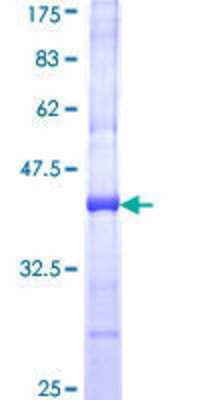Separase: Proteins and Enzymes
Separase is a cysteine protease that is essential for mitotic progression by separating sister chromatids. Each cell must receive one chromatid of every chromosome during mitosis. Cohesin plays an important role in cohering sister chromatids during the prophase through anaphase stages of mitosis, making certain that genomic information is replicated accurately. As the cellular division process continues, separase destroys cohesin by means of cleavage, allowing the chromatids to separate and divide with the cell. Separase activity is highly regulated. It not only cleaves cohesin at the onset of anaphase, but also cleaves itself, promoting downregulation of separase after anaphase. Should a human cell become an aneuploid (one too many or too few chromatids), the embryo most likely will not survive. Should the embryo survive, it will most likely develop severe birth defects or later develop malignant cancers. Separase antibodies can be used as a specific marker for centrosomes of mitotic cells. The staining of separase in centrosomes can be detected from prophase of mitosis up until anaphase.
Show More
4 results for "Separase Proteins and Enzymes" in Products
4 results for "Separase Proteins and Enzymes" in Products
Separase: Proteins and Enzymes
Separase is a cysteine protease that is essential for mitotic progression by separating sister chromatids. Each cell must receive one chromatid of every chromosome during mitosis. Cohesin plays an important role in cohering sister chromatids during the prophase through anaphase stages of mitosis, making certain that genomic information is replicated accurately. As the cellular division process continues, separase destroys cohesin by means of cleavage, allowing the chromatids to separate and divide with the cell. Separase activity is highly regulated. It not only cleaves cohesin at the onset of anaphase, but also cleaves itself, promoting downregulation of separase after anaphase. Should a human cell become an aneuploid (one too many or too few chromatids), the embryo most likely will not survive. Should the embryo survive, it will most likely develop severe birth defects or later develop malignant cancers. Separase antibodies can be used as a specific marker for centrosomes of mitotic cells. The staining of separase in centrosomes can be detected from prophase of mitosis up until anaphase.
Show More
| Applications: | WB, ELISA, MA, AP |

